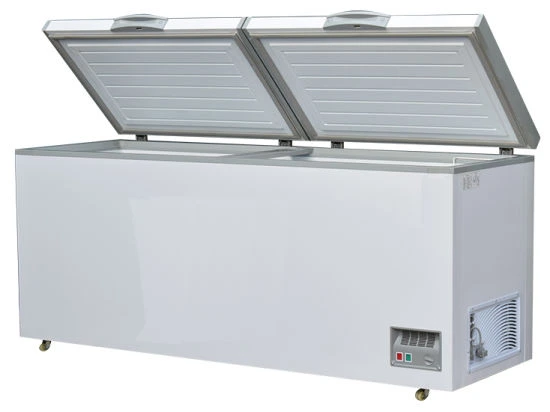
Small chest freezers have become indispensable appliances in modern households, offering convenient storage solutions for perishable goods while maximizing space efficiency. Whether you’re a busy parent looking to stock up on groceries or a homeowner seeking additional freezer capacity, these compact cooling units are worth considering for their versatility and practicality.
Benefits of Small Chest Freezers
Space-saving design
Small chest freezers are designed to maximize storage capacity while minimizing floor space. Their horizontal layout allows for efficient organization of items, making it easier to locate and retrieve goods without the need for excessive bending or reaching.
Energy efficiency
Unlike traditional upright freezers, small chest freezers typically consume less energy due to their superior insulation and lid design. This translates to lower utility bills and reduced environmental impact, making them a sustainable choice for eco-conscious consumers.
Temperature consistency
With advanced cooling technology, small chest freezers maintain a consistent temperature throughout the compartment, ensuring optimal storage conditions for frozen foods. This helps preserve food quality and minimizes the risk of spoilage, giving you peace of mind knowing that your groceries are safely stored.
Factors to Consider Before Purchasing a Small Chest Freezer
Before investing in a small chest freezer, there are several factors to consider to ensure that you find the right model for your needs:
Size and capacity
Evaluate your storage requirements and available space to determine the ideal size and capacity of the freezer. Consider factors such as the number of household members, frequency of grocery shopping, and types of items you plan to store.
Energy efficiency ratings
Look for energy-efficient models with high Energy Star ratings to minimize operating costs and environmental impact. Pay attention to features such as insulation quality, compressor efficiency, and temperature control mechanisms.
Additional features
Consider additional features such as adjustable shelving, interior lighting, and frost-free operation for added convenience and functionality. Some models may also offer digital displays, alarms, and remote monitoring capabilities for enhanced usability.
Top Brands in the Market
Several reputable brands dominate the small chest freezer market, each offering a range of models to suit different needs and budgets:
- Frigidaire
- Known for its reliability and durability
- Offers a variety of sizes and configurations to fit any space
- Haier
- Emphasizes innovation and modern design
- Features advanced cooling technology for optimal performance
- Danby
- Specializes in compact appliances for small spaces
- Offers energy-efficient models with customizable storage options
Maintenance and Care Tips
To prolong the lifespan of your small chest freezer and ensure optimal performance, follow these maintenance and care tips:
Cleaning and defrosting
Regularly clean the interior and exterior of the freezer to remove dirt, dust, and debris. Defrost the unit as needed to prevent ice buildup and maintain efficient cooling.
Proper organization of contents
Organize items within the freezer to maximize space and airflow. Use storage bins, baskets, and dividers to categorize and separate different types of foods for easy access.
Regular temperature checks
Monitor the temperature of the freezer regularly to ensure that it remains within the recommended range for safe food storage. Adjust settings as needed to maintain optimal conditions.
Innovations in Small Chest Freezer Technology
Advancements in technology have led to several innovations in small chest freezer design and functionality:
Advanced cooling systems
Newer models feature advanced cooling systems that optimize temperature control and energy efficiency. Variable-speed compressors, dual evaporators, and adaptive defrosting are just some of the innovations improving performance.
Smart features and connectivity options
Some small chest freezers now offer smart features such as Wi-Fi connectivity, mobile app integration, and voice control compatibility. These features allow you to monitor and control the freezer remotely for added convenience.
Uses Beyond Home Storage
While small chest freezers are primarily used for home storage, they also have various other applications:
Commercial applications
Small chest freezers are commonly used in restaurants, cafes, and foodservice establishments to store frozen ingredients, pre-prepared meals, and ice cream products.
Camping and outdoor activities
Portable small chest freezers are popular among campers, RV owners, and outdoor enthusiasts for keeping perishable foods and beverages cold during extended trips.
Environmental Impact
As consumers become more environmentally conscious, the environmental impact of appliances like small chest freezers is gaining attention:
Energy consumption and sustainability
Energy-efficient models help reduce greenhouse gas emissions and minimize the carbon footprint associated with household appliances. Look for Energy Star certified freezers to support sustainability efforts.
Recycling and disposal options
When disposing of old or obsolete freezers, consider recycling options to minimize waste and maximize resource recovery. Many appliance retailers and recycling centers offer programs for proper disposal and recycling of appliances.
Comparison with Upright Freezers
While both small chest freezers and upright freezers serve the same purpose of freezing and storing food, there are some key differences between the two:
Differences in design and functionality
Small chest freezers have a horizontal layout with a top-opening lid, making them more space-efficient and easier to organize. Upright freezers, on the other hand, have a vertical design with shelves and drawers for better visibility and accessibility.
Suitability for different needs
Small chest freezers are ideal for households with limited space or irregularly shaped areas, whereas upright freezers are better suited for kitchens with ample floor space and a need for organized storage.
Cost Considerations
When comparing the cost of small chest freezers, consider both the initial investment and long-term operating costs:
Initial investment vs. long-term savings
While small chest freezers may have a higher upfront cost than upright freezers, they often offer greater energy efficiency and lower operating costs over time. Factor in energy savings and potential rebates or incentives when making your purchase decision.
Value for money
Evaluate the features, quality, and reputation of different brands to determine the best value for your budget. Consider factors such as warranty coverage, customer service, and overall durability when weighing your options.
Customer Reviews and Recommendations
Before making a final decision, read customer reviews and recommendations to learn about real-world experiences with specific models:
Real-world experiences
Look for reviews from verified customers who have used the freezer for an extended period. Pay attention to comments about performance, reliability, noise levels, and customer service experiences.
Factors influencing satisfaction
Consider factors such as temperature consistency, storage capacity, durability, and ease of use when evaluating customer feedback. Look for patterns and trends in reviews to identify strengths and weaknesses of different models.
Installation and Setup Guide
When installing your small chest freezer, follow these guidelines to ensure optimal performance and safety:
Location considerations
Place the freezer in a well-ventilated area away from direct sunlight, heat sources, and moisture. Leave adequate space around the unit for airflow and accessibility.
Proper ventilation requirements
Ensure that the freezer has sufficient clearance on all sides to allow for proper ventilation and heat dissipation. Avoid placing the freezer in enclosed spaces or tight alcoves that restrict airflow.
Troubleshooting Common Issues
If you encounter any issues with your small chest freezer, try these troubleshooting steps before contacting customer support:
Temperature fluctuations
Check the thermostat settings and adjust as needed to maintain the desired temperature. Ensure that the freezer door is properly sealed and free of obstructions that could prevent a tight seal.
Strange noises or odors
Inspect the interior of the freezer for any foreign objects or spills that may be causing unusual odors or noises. Clean the interior with mild detergent and warm water to eliminate any lingering smells or residues.
Future Trends in the Small Chest Freezer Industry
Looking ahead, several trends are shaping the future of small chest freezers and refrigeration technology:
Predictions for upcoming advancements
Expect to see continued innovation in energy efficiency, connectivity, and convenience features as manufacturers strive to meet consumer demand for sustainable and user-friendly appliances.
Anticipated changes in consumer preferences
As awareness of environmental issues grows, consumers are likely to prioritize energy-efficient and eco-friendly appliances that minimize their carbon footprint. Look for increased adoption of smart technologies and sustainable materials in future freezer designs.
Conclusion
In conclusion, small chest freezers offer a compact and efficient solution for storing frozen foods in homes, businesses, and outdoor settings. With their space-saving design, energy efficiency, and advanced features, they provide convenient storage options while minimizing environmental impact. By considering factors such as size, capacity, energy efficiency, and brand reputation, you can find the perfect small chest freezer to suit your needs and budget. For more details visit us at Oz Coolers.
FAQs
- Q: Are small chest freezers suitable for apartments or small kitchens?
- A: Yes, small chest freezers are designed to fit in tight spaces and can be a practical storage solution for apartments or small kitchens.
- Q: How often should I defrost my small chest freezer?
- A: It depends on usage and frost buildup, but typically, defrosting every six months to a year is recommended to maintain optimal performance.
- Q: Can I use a small chest freezer as a refrigerator?
- A: Some models offer convertible features that allow you to adjust the temperature settings for refrigeration purposes, but it’s not recommended for extended use.
- Q: Do small chest freezers require special installation?
- A: While they don’t require complicated installation, it’s essential to place the freezer in a well-ventilated area with proper clearance for airflow.
- Q: How long do small chest freezers typically last?
- A: With proper maintenance and care, small chest freezers can last upwards of 10 to 15 years, depending on usage and environmental conditions.



